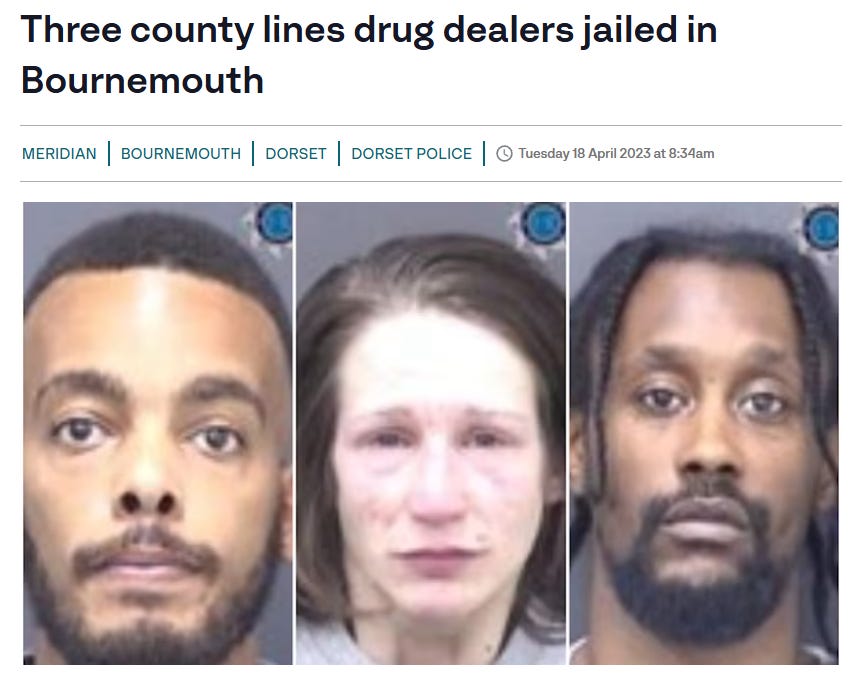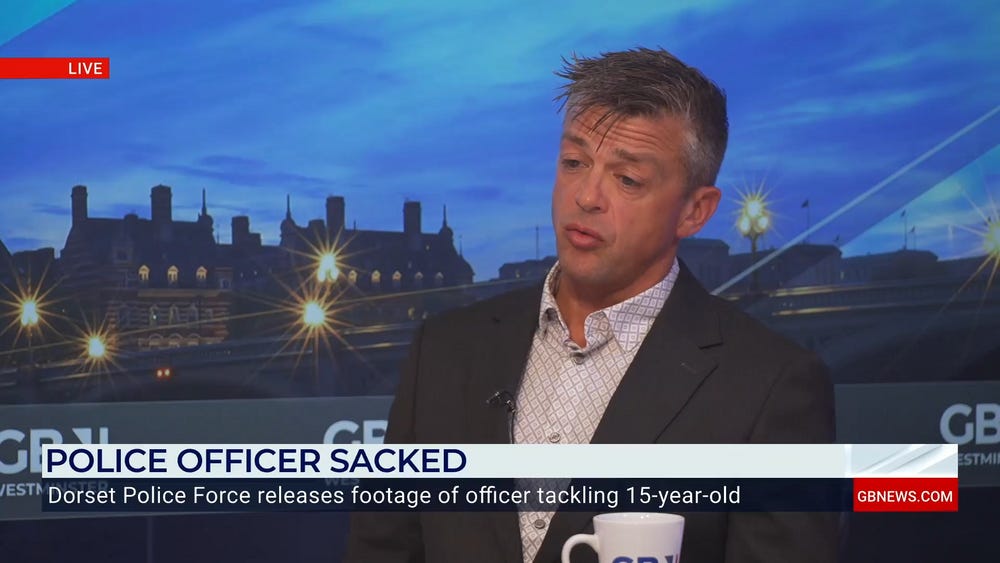Dorset Police isn't institutionally racist, it's being institutionally misled
Flawed statistics. Ideological crusades. And a police officer dismissed for doing his job. The deficits in leadership at the top of British policing are becoming ever-clearer.
The dismissal of former PC Lorne Castle casts a troubling spotlight on the leadership of Dorset Police—a force that appears increasingly detached from operational reality, critical thinking and principles of natural justice. It also begs questions of the Assistant Chief Constable drafted in from Wiltshire to chair the proceedings.
The move away from Legally Qualified Chairs was something I have argued against, precisely because it has been increasingly clear for some time that British policing is in some sort of free-fall collapse, with many Chief Constables and senior officers seemingly intent on reaching terminal velocity.
While there’s no allegation of racism in the case of PC Lorne Castle, it’s important to understand the wider context in which Dorset Police has been operating.
Deeply Flawed Statistics Weaponised by Bad-Faith Actors, Embraced by Chiefs
For many years Dorset Police has been an outlier when it comes to stop and search and racial disproportionality. I have remarked upon and even sought to defend, Dorset Police in this context over an extended period.
Routinely lambasted, as they and other forces have been, for being racist in their use of stop and search by activists, including those in receipt of funds from such once well-regarded bodies as the Wellcome Trust.
Of course, the attacks are essentially politically and ideologically motivated, so there’s little interest on the part of those wielding them to dive any deeper. What’s terrifying is the lack of any real push back on the part of forces.
The statistics on stop and search in which stops are compared to census population data are almost completely worthless. They compare apples with oranges: the number of stops (which could all be of one person) against the number of individual people recorded in the Census. Plus, we know that the Census population is always hopelessly out of date - and doesn’t reflect the available population on the street.
Despite raising the issue far and wide, including at a particularly hopeless meeting of the Association of Police and Crime Commissioners and the National Police Chiefs’ Council at the British Transport Police Headquarters a few years ago, nobody dared or else had the intellectual capacity to meaningfully engage with these reasonable and valid criticisms.
On the metrics that Dorset Police - and many other Chief Constables, forces and the Home Office - are wedded to, if a county line gang happens to run drugs into Dorset from ethnically more diverse areas like Birmingham, London, or Bristol, and Dorset cops dare to take action, the reality is that it will send the racial disparity figures off the scale.
The logical result then is that some senior officers would prefer to see their force withdraw from the fight against crime and disorder, where it should in fact be advancing.
But, it doesn’t stop there.
Procedural Justice or Performative Nonsense?
Dorset Police routinely invite an ‘indepdenent scrutiny panel’ to review stop and searches and use of force encounters. The panel, comprised of often unnamed members of the public, get to share their thoughts, or in some cases grind their axes.
These individuals review incidents on various metrics of procedural justice, devised by academics at the University of Cambridge who have most likely never dealt with an angry man - or a violent knife-carrying teenager.
Voice: Was the person stopped allowed to give their side of the story or ask questions?
Neutrality: Were the officer’s decisions unbiased and guided by transparent reasoning?
Dignity and respect: Did the officer treat the person stopped with dignity and respect?
Trustworthy motives: did the officer seek to explain and encourage understanding?
It doesn’t take a rocket scientist to see how this can easily go awry.
In this example, the conclusion was that the officer “should have been alive to the suspect’s needs”:
In other examples, the panel questions the use of handcuffs - even when individuals are reported to be drug dealing, run off and are subsequently found in possession of drugs, cash and weapons.
More Deeply Flawed Statistics for Use of Force
We also see junk statistics trotted out to examine disproportionality in the use of force. In 2024/25, Dorset Police consider their headline rate of racial disproportionality in use of force to be 6.87x for black people.
That is to say, Dorset Police officially believe that black people are 7 times more likely to be subject to the use of force by police than a white person.
But it’s total junk. It takes the number of use of force reports against black people and then divides it by the number of black people showing up in Census data.
So, if a small gang of violent non-white drug dealers from a large ethnically diverse urban centre - such as London, Birmingham or Bristol - descend on Dorset and violent turf wars ensue, causing the police to need to use force to arrest, or search or otherwise deal with these criminals, the denominator doesn’t even include the individuals in question!
This isn’t even a hypothetical scenario - here is just one example of black London drug dealers descending on Dorset to deal crack cocaine and heroin:
Neither of the two men pictured would show up in the Census data for Dorset Police force area, yet any uses of force, searches or arrests on them in Dorset would show up in the force’s own measures of disproportionality. Ditto any teenagers who they might be exploiting or otherwise to sling drugs and beat people up on their behalf.
The fact that senior police officers, senior police staff, and the Home Office show little or no appetite in recognising this simple, but serious, flaw at the heart of the entire “racial disproportionality” junket reveals either an intellectual or courage deficit at the heart of British policing.
Conceptually, is it really any different to the intellectual or courage deficit that enabled the Pakistani rape gangs scandal to go unchecked?
But, rather than show the intellectual capacity and moral courage to thoroughly examine these issues, we see police chiefs, including Dorset’s Chief Constable, essentially use these flawed statistics to declare their force “institutionally racist”:
Hitting Ctrl+Alt+Del on Policing is Now Inevitable
Chief Constable Pearson doesn’t stop at political virtue-signalling based on the flawed data, she goes even further by seeking to pervert and weaken operational policing activity and officer discretion off the back of it:
We hear police chiefs regularly assert the importance of ‘operational independence’ and the need to ‘keep politics out of policing’, but when police chiefs uncritically ingest flawed and weaponised data, and embrace ideological and activist agendas with no regard for the oath they swore or the fundamental principles of fairness and impartiality, it is clear that a Ctrl+Alt+Del moment for policing is inevitable.
In the words of a growing number of commentators, officers, former officers and members of the public: “You can’t reform this”.
What Role Police and Crime Commissioners?
Of course, all of this begs the question of how and why a Chief Constable feels able to make such bold declarations, and pervert core policing activity, on such a weak and insecure foundation.
Well, at least some of the people of Dorset voted for a Police and Crime Commissioner to hold the Chief Constable to account, to publish a Police and Crime Plan, and to undertake a number of other statutory duties.
Dorset’s Police and Crime Commissioner is David Sidwick, a kind and thoughtful man who I have a lot of time for. But one is left wondering why the Chief Constable has been allowed to rush headlong into some sort of ideological crusade on the weakest of footings.
The Chief Constable even declared, in her admission of institutional racism, that the “Police and Crime Commissioner and I have discussed my decision at length – he supports this position, and I will be keeping him updated on this work as it progresses.”
Furthermore, in the wake of the dismissal of PC Lorne Castle, the Police and Crime Commissioner has stayed aligned to his Chief Constable in statements dated 30 May 2025 and 3 June 2025.
Personally, I think he should reconsider.
Given the strength of feeling from both frontline police officers and the wider law-abiding public, I think his position on this and the Chief Constable’s vision and programme is worthy of some serious and much-needed reconsideration.
There should be no shame in such a move, indeed, it should be welcomed and would be popular.
Even the Response to the Dismissal by Dorset Police is Troubling
It is an affront to natural justice to see former PC Lorne Castle dismissed for what might at best/worst (depending on your persepective) be described as an imperfect arrest of a knife-carrying suspect wanted for violent offences.
But it’s a further affront that despite the extensive interest in this case, the misconduct hearing report still hasn’t been published - and yet Dorset Police took it upon themselves to publish only a short, selective extract of the incident captured on body worn video:
It’s not fair and it’s not right. It’s playing fast and loose with public trust to selectively publish body worn video that doesn’t show the context of the incident.
The Reality of Policing is Messy and Imperfect
Policing is often an imperfect and messy experience when force comes to be applied. Confronting criminals who are prone to resist is always likely to involve a use of force and disingenuous claims of brutality and innocence from the criminal, especially when caught red-handed. Critically, cops are human too.
Sadly, Dorset Police’s leadership - and the visiting Assistant Chief Constable from Wiltshire Police who chaired the panel - seem to show no such recognition or empathy for these inescapable realities.
When was the last time any of the Chief Officers involved found themselves confronting a knife-carrying, resisting, violent teenager?
We must afford police officers some reasonable latitude in the execution of their duty. If I were a Sergeant or Inspector, and an officer had brought this incident to my attention, gross misconduct would have been a very distant consideration.
Instead, this would and should have been an opportunity to debrief the job. To give Lorne an oppportunity to share the circumstances and for him and his colleagues (less experienced or otherwise) to consider what might have been done differently, to consider and fully explore the threats and risks present, and a reminder of the wide range of methods that can help secure and maintain control of a situation and a suspect.
I wasn’t there, but I’ve been in similar situations, and while I think there’s some scope for learning and reflection - on the part of all connected with the incident - there is no way that, on the facts known at this time, that this should have ended in dismissal. It’s why I’m proud to have donated to the Crowdfunder organised by Christopher Amey.
I share Lorne Castle’s hope that some good will eventually come of his ordeal
But, the sad reality is that the necessary reset will only be delivered via the ballot box and a radical programme - that still needs to be developed.
In the meanwhile, perhaps Lorne’s case demonstrates how some senior officers expect to end the racial disparities in policing. Ensuring that officers become so fearful of their careers and freedom, that they simply don’t bother policing at all.
Now more than ever, it should be clear to see that one of the major problems for British policing isn’t being “institutionally racist”, but being institutionally misled.














Has HO research ever looked at stop and search data compared to the street population at the times when searches take place rather than the residential population?
For the last 4 years I have used a ‘critical analysis’ around ethnic disproportionality of stop & search in Dorset in my university lectures focusing on Issues in Law Enforcement (the module) as a way of explaining how certain anomalies can distort the statistics…in particular back in 2011/12/13 when Dorset was second only to the Met for the number of stop & searches of black males out all 43 forces I highlight this…when that realisation comes to bare that it’s not purely an ‘institutional’ issue there’s never a single question raised from the students and they understand the phenomena that has occurred and why…it’s all about context and going deeper than the statistics being taken at face value…which is often a mistake to do so…it’s about understanding a problem so you can then determine a solution…and the fact that the govt has in the past failed to do so when auditing and so has the SLT in Dorset at this juncture gives cause for concern here…they above anybody else should understand this…the last thing you need to do is create problems that don’t exist or exist in the form that is perceived so it is vital that a critical eye is cast and only when the problem is verifiable make efforts to resolve things…if not explain your rationale and defend your position accordingly…simply admitting to there being a bigger problem than it is just makes it harder to rectify things as it’s either a false positive or leads to perverse outcomes…neither of which are healthy or helpful in the world of modern policing